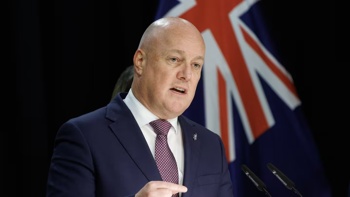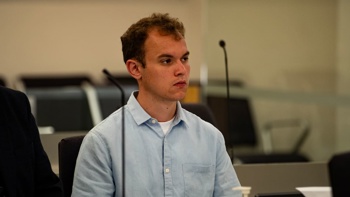

Former Dilworth housemaster Ian Wilson, who is currently serving jail time for sexually abusing several students, claims to have a renewed commitment to God and has vowed to be truthful going forward, particularly with his supporters integral to his release.
But Wilson’s word drew scepticism from a member of the Parole Board when he appeared today for another bid for freedom.
“You’ve lived a whole life where you’ve been deceitful to people you’ve worked with, people you’ve known really well and then through this court process where it seems you’ve only admitted offending when you’re confronted with it,” board member Bryan McMurray told the 72-year-old.
“You haven’t been proactive, from what I’ve read, about providing the details of other victims that you might have had, that is what is behind my scepticism about your newfound honesty with people who support you.”
McMurray said he had worked in the justice sector for more than 50 years and in his experience change takes time.
“It takes a lot of practice for new behaviours to become habits.”
Wilson’s dishonesty was an issue raised by two of his victims who made submissions to the board against an early release.
Neil Harding, who has waived his automatic name suppression rights, said Wilson had lied repeatedly when asked about further victims.
He believed Wilson had not shown any genuine remorse and that he remained a risk to young men.
- 20 years of abuse: Ex Dilworth assistant headmaster jailed
- Dilworth sexual abuser granted sentence discount after appeal
- Dilworth abuse: 80 more victims come forward, 33 new charges laid
- Dilworth case: Fourth accused loses name suppression
- Dilworth headmaster appalled following six arrests for historical sexual offending
Harding, and another victim, who cannot be named, implored the board to keep Wilson behind bars for his entire sentence.

Neil Harding told the Parole Board he believed Ian Wilson was still a risk to the community. Photo / NZME
The hearing, which concluded with him being declined parole for the fourth time, heard he has a group of “mature” people he has known for decades who were willing to support him upon release.
They vowed to hold him to account and assist him in various ways including logistically, emotionally, and with his wish to attend a church in Manukau.
But McMurray was concerned whether Wilson would be open and honest with his supporters when discussing issues with them.
“You are a very practiced liar and deceiver. You hid this offending for a long time.”
McMurray asked if he could turn around a lifetime of deceit.
Wilson said he could.
“That comes from a renewed understanding of my commitment to God but that aside, I’ve only got the truth and certainly these five people that I’m working with, that I value their support. It has to work, it has to be that way.”
Wilson, who is currently battling health conditions including prostate cancer and diabetes, worked at Dilworth from February 1971 until his resignation in December 1996.
He was arrested in 2020 as part of Operation Beverly, a long-running investigation into historical sexual abuse by several staff members at the Auckland-based boys-only boarding school.
The former housemaster and scouting volunteer was jailed in March 2021 for three years and seven months for indecently assaulting five students between 1975 and 1992 - some of them more than once and over a period of several years.
Wilson was still in jail when he had one year and 11 months added to his sentence in August last year after belatedly admitting to having abused five others.
At today’s parole hearing, he was grilled on the “rampant” sexual offending against Dilworth students and his involvement.
McMurray pointed to credible claims that several people perpetrating the offending knew about each other’s offending.
Wilson denied he knew other staff members were sexually abusing students.
“There was talk about it and suggestions but from what I knew, if you like, what I saw, I didn’t see anything.”
McMurray said it was not possible to believe Wilson did not know.
Judge Arthur Tompkins, panel convenor, also highlighted Wilson’s issues with the truth.
He said Wilson had not previously been forthcoming about the number of his victims and the extent of his offending.
Wilson claimed to have not remembered some of the offending but said he accepted it happened by pleading guilty.
“Are there other victims still out there that you haven’t identified or acknowledged?” Tompkins asked.
“Not that I’m aware of, your honour. There could be people who come forward depending on the situation or the circumstances. But there are none that I am aware of,” Wilson responded.
Judge Tompkins said a psychological assessment might suggest Wilson was very skilled in “manipulative impression management”.
He said the report stated Wilson appeared strongly motivated to present himself as “remorseful, co-operative and sincere” in his attempts to change and to address the damages he had done in his past.
At times it was unclear whether Wilson was answering questions genuinely or in a way that would portray him in the best possible light, Tompkins said the report read.
Wilson said he had given genuine responses.
In his bid for an early release, Wilson’s counsel Mark Edgar said on his behalf that he had been assessed as a below-average risk of reoffending and would abide by suggested release conditions.
He had undergone psychological counselling, was of frail health and had a decreased sexual libido, Edgar said.
But the board declined to grant him parole and asked for a more detailed and longer-term release plan, a plan for dealing with media interest and for trial visits to his proposed accommodation to take place.
Wilson will next appear before the board in February.
Tara Shaskey joined NZME in 2022 as a news director and Open Justice reporter. She has been a reporter since 2014 and previously worked at Stuff covering crime and justice, arts and entertainment, and Māori issues.

Take your Radio, Podcasts and Music with you









